Iraqi Kurdistan profile - timeline
- Published
A chronology of key events:
1918 - After the defeat of the Ottoman Empire in the First World War, British forces occupy the oil-rich Ottoman province of Mosul, bringing extensive Kurdish-populated areas under British rule.
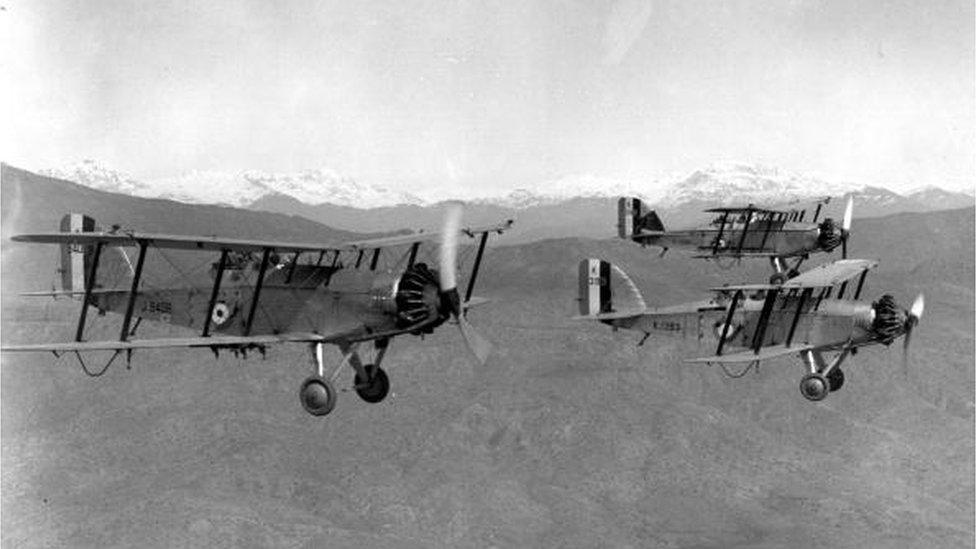
British air force planes fly a reconnaissance mission over Kurdistan in 1934. A few years later the air force bombed Kurdish rebels resisting British rule
1919 - Mosul area is added to the new Iraqi state, which comes under a British mandate.
1920 - Treaty of Sevres, signed by the defeated Ottoman government, provides for a Kurdish state, subject to the agreement of the League of Nations. Article 64 of the Treaty gives Kurds living in the Mosul vilayet the option of joining a future independent Kurdistan.
1921 - Emir Faysal crowned king of Iraq, including Mosul.
Uprising
1923 - Shaykh Mahmud Barzinji rebels against British rule and declares a Kurdish kingdom in northern Iraq.
1923 - Kemal Ataturk's newly founded Turkish Republic gains international recognition with the Treaty of Lausanne. The Treaty of Sevres is not ratified by the Turkish parliament.
1924 - Sulaymaniyah falls to British forces.
1932 - Uprising in the Barzan region to protest at Iraq's admittance to the League of Nations, while Kurdish demands for autonomy are ignored.
1943 - Mullah Mustafa Barzani leads another uprising, and wins control of large areas of Irbil and Badinan.
1946 August - British RAF bombing forces Kurdish rebels over border into Iran where they join Iranian Kurds led by Qazi Mohamed, who founds an independent Kurdish state in Mahabad.
1946 - Kurdistan Democratic Party (KDP) holds its first congress in Mahabad. Within a few months, the "Mahabad Republic" collapses under attack from Iranian forces, and Mustafa Barzani flees to the Soviet Union.
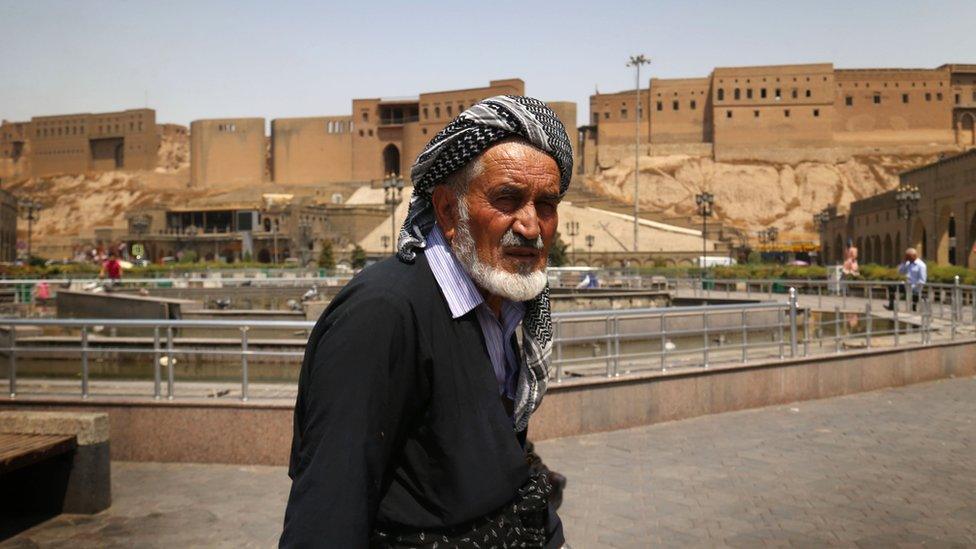
Irbil is a city with a history stretching back over thousands of years
1951 - A new generation of Kurdish nationalists revives the KDP. Mullah Mustafa Barzani is nominated president while in exile in the Soviet Union, but the real leader of the KDP is Ibrahim Ahmad, who favours close ties with the Iraqi Communist Party.
1958 - Overthrow of the Iraqi monarchy allows Kurdish nationalists to organise openly after many years in hiding. A new Iraqi constitution recognises Kurdish "national rights" and Mullah Mustafa Barzani returns from exile.
1960 - Relations between the Iraqi government and Kurdish groups become strained. The KDP complains of increasing repression.
1961 - KDP is dissolved by the Iraqi government after Kurdish rebellion in northern Iraq.
Autonomy granted
1970 March - Iraqi government and the Kurdish parties agree a peace accord, which grants the Kurds autonomy. The accord recognises Kurdish as an official language and amends the constitution to state that: "the Iraqi people is made up of two nationalities, the Arab nationality and the Kurdish nationality."
1971 August - Relations between the Kurds and the Iraqi government deteriorate. Mullah Mustafa Barzani appeals to the US for aid.
1974 March - Iraqi government imposes a draft of the autonomy agreement and gives the KDP two weeks to respond. Mullah Mustafa Barzani rejects the agreement, which would have left the oilfields of Kirkuk under Iraqi government control, and calls for a new rebellion.
1975 March - Algiers Accord between Iran and Iraq ends Iranian support for the Kurdish uprising, which collapses. Barzani withdraws from political life.
1975 June - Jalal Talabani, a former leading member of the KDP, announces the establishment of the Patriotic Union of Kurdistan (PUK) from Damascus.
1978 - Clashes between KDP and PUK forces leave many dead.
1979 - Mullah Mustafa dies, his son Massoud Barzani takes over the leadership of the KDP.
Iranian involvement
1980 - Outbreak of war between Iran and Iraq. KDP forces work closely with Iran, but the PUK remains hostile to cooperation with Tehran.
1983 - An Iranian counterattack opens a northern front in Kurdish northern Iraq. With support from KDP fighters, Iranian troops take the key town of Hajj Umran. Human rights organisations say Iraqi troops killed around 8,000 men from the KDP leader's home area of Barzan in revenge.
1983 - PUK agrees to a ceasefire with Iraq and begins negotiations on Kurdish autonomy.
1985 - Under increasing Iraqi government repression, the ceasefire begins to break down. Pro-Iraqi government militia men kill Jalal Talabani's brother and two nieces.
1986 - Iranian government sponsors a meeting reconciling the KDP and PUK. Now both major Kurdish parties are receiving support from Tehran.
1987 - Jalal Talabani and Massoud Barzani join forces with a number of smaller Kurdish factions to create the Kurdistan Front.
1988 - As the Iran-Iraq war draws to a close, Iraqi forces launch the "Anfal Campaign" against the Kurds. Tens of thousands of Kurdish civilians and fighters are killed, and hundreds of thousands forced into exile, in a systematic attempt to break the Kurdish resistance movement.
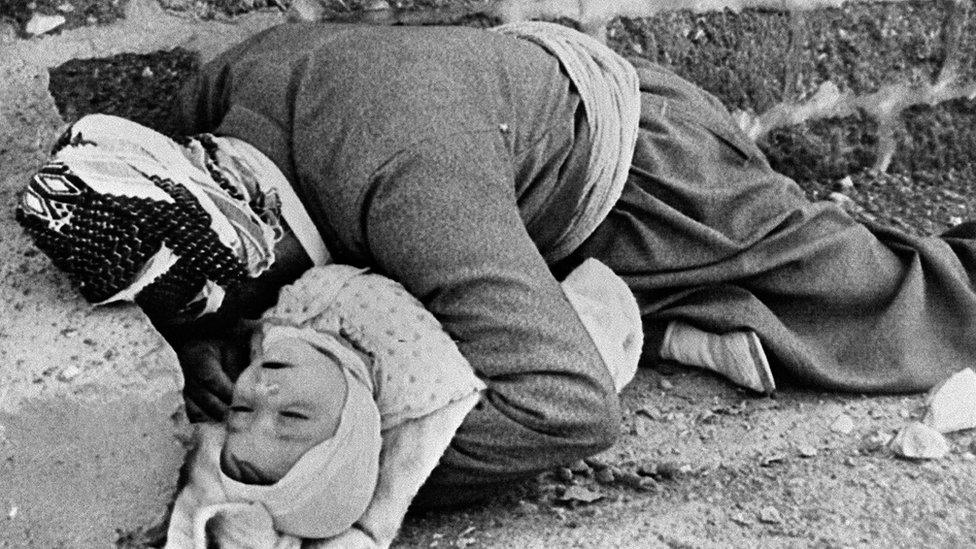
A Kurdish father and his babe in arms were among thousands of victims of a poison gas attack on Halabja
1988 16 March - Thousands of Kurdish civilians die in a poison gas attack on the town of Halabjah near the Iranian border. Human rights watchdogs and Kurdish groups hold the Iraqi regime responsible.
1991 March - After the Gulf War in which US-led forces expel Iraqi forces from Kuwait, Iraq puts down a Kurdish rebellion. Around 1.5 million Kurds flee before the Iraqi onslaught, but Turkey closes the border forcing hundreds of thousands to seek refuge in the mountains.
Safe haven
1991 April - Coalition forces announce the creation of a "safe haven" on the Iraqi side of the border. International aid agencies launch a massive aid operation to help the refugees. Meanwhile, Jalal Talabani and Massoud Barzani open negotiations with Saddam Hussein on autonomy for Kurdistan.
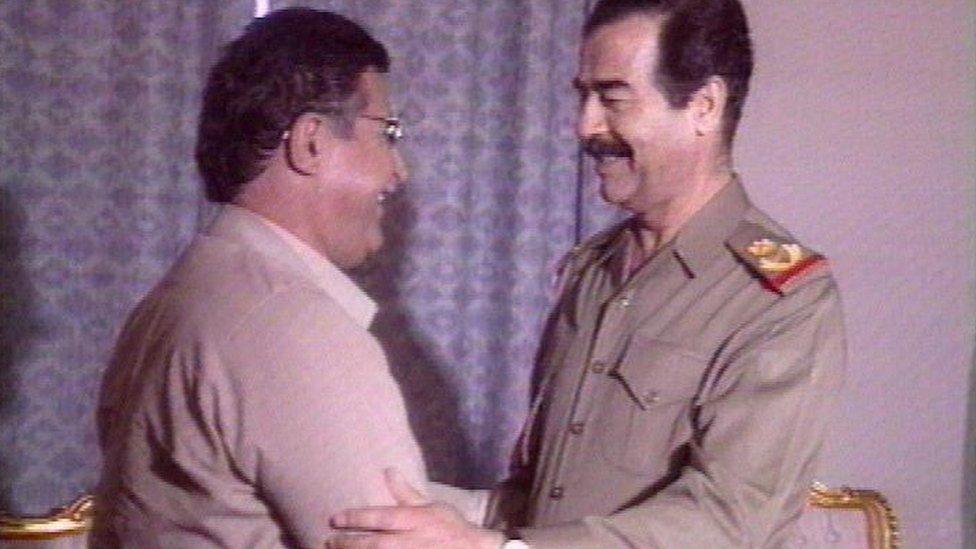
The Kurdistan Patriotic Union leader Jalal Talabani met Iraqi President Saddam Hussein to negotiate an autonomy agreement
1991 July - Talks continue in Baghdad, but Kurdish peshmerga forces take control of Irbil and Sulaymaniyah, in defiance of Iraqi government orders.
1991 October - Fighting between Kurdish and Iraqi government forces breaks out in earnest. Saddam Hussein fortifies the border of Kurdish-held northern Iraq and imposes a blockade.
1992 May - Elections held in areas under Kurdish control give KDP candidates 50.8% of the vote, while the PUK takes 49.2%. The two parties are equally balanced in the new Kurdish government.
1992 September - Newly-established Iraqi National Congress (INC), which brings together a wide-range of Iraqi opposition groups, meets in Salah-al-Din in the Kurdish-held north. KDP and PUK representatives take part.
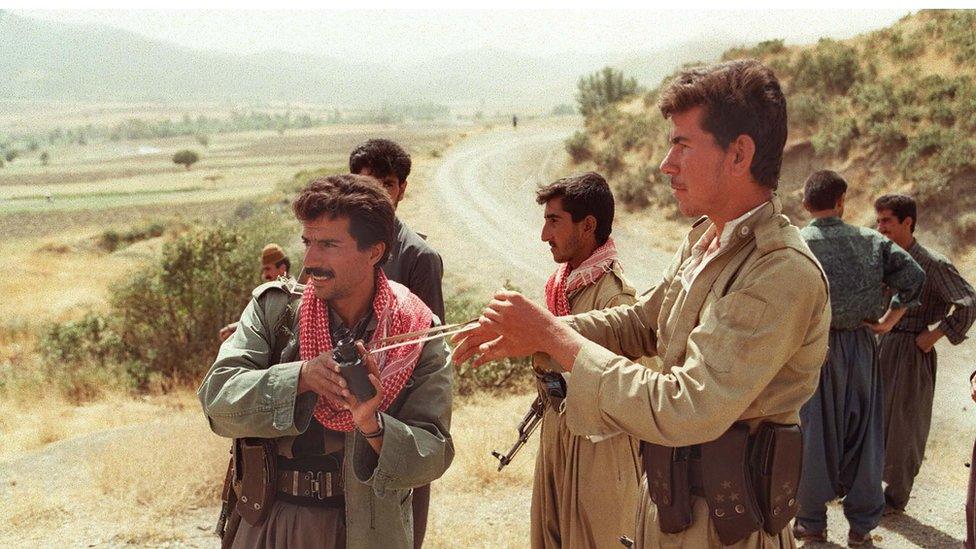
Rivalries between Kurdish factions developed into outright civil war
1994-97 - Civil war involving KDP and PUK forces.
1996 May - UN agrees "Oil-for-Food" programme with Baghdad; 13% of the proceeds from Iraqi oil exports are earmarked for the three northern governorates, which are largely under Kurdish control.
1996 August - Masoud Barzani appeals to Saddam Hussein for help to defeat the PUK.
1996 September - With the help of Iraqi government troops, KDP forces seize the northern city of Irbil and take the PUK stronghold of Sulaymaniyah. A new KDP-led government is announced at the parliament building in Irbil.
1996 October - PUK forces retake Sulaymaniyah.
1997 January - PUK announces a new government based in Sulaymaniyah. Both the PUK and KDP claim jurisdiction over the whole of the Kurdish-controlled north.
1998 September - Jalal Talabani and Masoud Barzani sign a peace agreement in Washington, but government of the Kurdish region remains split between the two rival administrations.
2000 November - In a letter to the United Nations secretary-general, the PUK accuses the Iraqi government of expelling Kurdish families from Kirkuk.
2001 September - Fighting breaks out between the PUK and the Islamic fundamentalist group Jund al-Islam, later renamed Ansar al-Islam.
Moves toward unity
2002 June - PUK and KDP officials take part in joint discussions with other Iraqi groups aimed at coordinating the work of the opposition in the event of a US-led military campaign against Iraq.
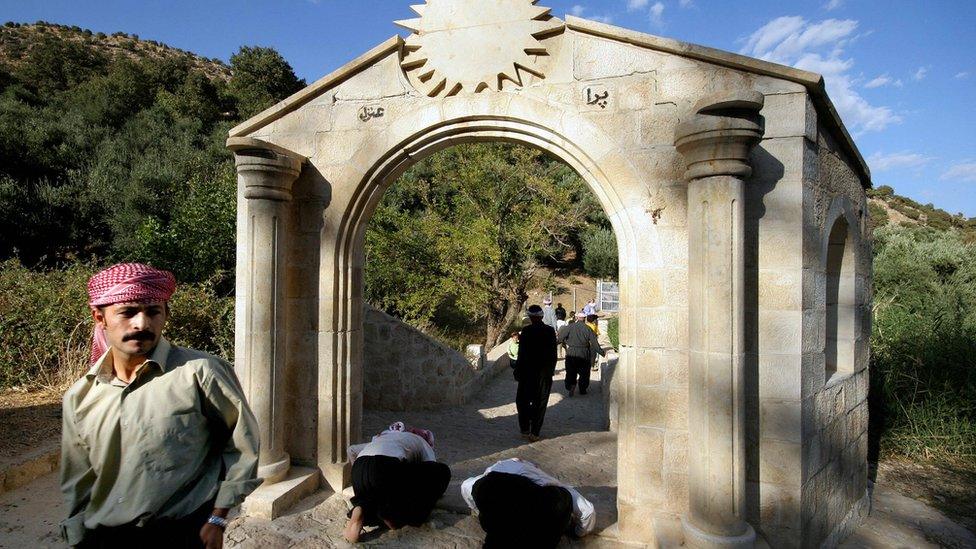
Members of the Yazidi religious sect make up a significant minority in Iraqi Kurdistan
2002 October - Joint session of the Kurdish parliament convenes in Irbil. KDP and PUK parliamentarians agree to work together during a "transitional session" until new elections can be held.
2003 February - US Secretary of State Colin Powell accuses Iraqi Kurdish Islamist group Ansar al-Islam of playing a pivotal role in linking Osama Bin Ladin's al-Qaeda network with the Iraqi regime.
2003 February - Kurdish leaders reject proposals to bring Turkish troops into northern Iraq as part of a US-led military campaign to oust Saddam Hussein. Anti-Turkish demonstrators take to the streets of Kurdish towns.
2003 February - Failure of a parliamentary bill allowing US troops to deploy on Turkish soil hits American plans to open a northern front against Iraq.
2003 3 March - KDP and PUK create a "joint higher leadership" in the Kurdish-held north, under the chairmanship of the two party leaders, Massoud Barzani and Jalal Talabani.
US-led campaign against Iraq
2003 20 March - US-led coalition forces invade Iraq and begin bombardment of Baghdad and other cities. Mosul and Kirkuk near the Kurdish enclaves come under heavy fire.
2003 22 March - Coalition forces launch Cruise missile attack on bases held by Ansar al-Islam in the north. Dozens killed in the headquarters of the Islamic Group, an unrelated radical Islamist faction when a missile hits the Khormal area.
2003 27 March - Hundreds of US paratroopers land near Irbil, signalling the opening of a northern front in the war on Iraq.
2003 9 April - US forces advance into central Baghdad. Saddam Hussein's grip on the city is broken. In the following days Kurdish fighters and US forces take control of the northern cities of Kirkuk and Mosul.
2003 July - Interim governing council (IGC) meets for first time. Saddam's sons Uday and Qusay killed in gun battle in Mosul.
2004 1 February - At least 56 people die and more than 200 people are injured after a double suicide bombing at the offices of the two main political Kurdish parties in the northern city of Irbil. Several senior political figures are among the dead.
2005 January - An alliance of Kurdish parties comes second in Iraq's landmark national election, sending 77 deputies to an interim parliament.
2005 April - PUK leader Jalal Talabani is elected as interim Iraqi president by MPs.
2005 May - At least 50 people are killed in a suicide bomb attack on police recruits in Irbil.
Kurdish parliament
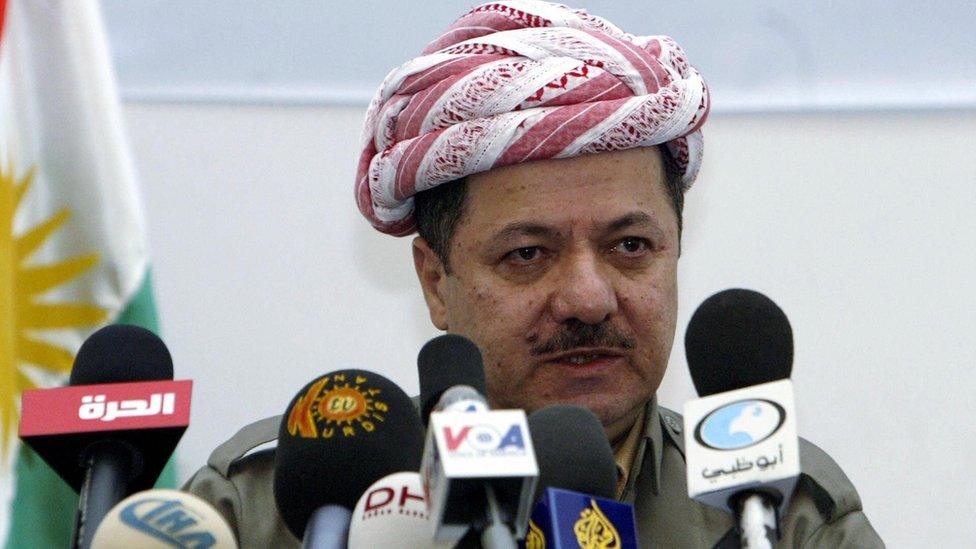
Massoud Barzani was elected president of the autonomous region in 2005
2005 June - First session of Kurdish parliament held in Irbil; KDP's Massoud Barzani is president of autonomous region.
2005 December - News that a foreign firm has begun drilling for oil in the Kurdish north sparks new fears of secession among Iraqi Sunni leaders. Kurdish authorities later report a "major discovery" of oil.
2006 September - Massoud Barzani orders the Iraqi national flag be replaced with the Kurdish one in government buildings. But Iraq's Prime Minister Nuri al-Maliki says: "The Iraqi flag is the only flag that should be raised over any square inch of Iraq."
2006 September - Five blasts caused by one suicide truck bomb and four car bombs kill 23 people in Kirkuk.
The BBC's Newsnight programme reports that former Israeli commandos secretly trained Kurdish soldiers in Northern Iraq to protect a new international airport and in counter-terrorism operations.
2007 April - The head of Turkey's military says his country should launch an operation against Kurdish guerillas based in northern Iraq.
2007 May - The Kurdish regional government takes over responsibility for security in the three Kurdish provinces from the US forces.
2007 July - Human Rights Watch gives details of torture and abuse in prisons run by the Kurds in the Kurdish area of northern Iraq.
2007 August - At least 300 people are killed in a series of bomb attacks on members of the Kurdish Yazidi sect in northern Iraq.
2007 September - Iran shells rear bases of Kurdish rebels in Iraqi Kurdistan.
Iran closes its border with Iraqi Kurdistan to protest at the detention of an Iranian by US troops.
Turkish attacks
2007 October - Turkish parliament gives go-ahead for military operations in Iraq in pursuit of Kurdish rebels. Turkey comes under international pressure to avoid an invasion.
2007 November - A referendum on whether Kirkuk province should become part of Iraqi Kurdistan is due to be held, but is in the event put on hold indefinitely.
2007 December - Turkey launches air strikes on fighters from the Kurdish PKK movement inside Iraq.
2008 February - Turkish forces mount a ground offensive against PKK Kurdish rebel bases in northern Iraq.
2008 September - Iraqi parliament passes provincial elections law. City of Kirkuk, claimed by Kurdistan Region, is excluded from provisions of law until its status is settled.
2009 April - Turkish warplanes bomb PKK Kurdish rebel positions in northern Iraq after Turkey accused the group of killing Turkish soldiers in two attacks.
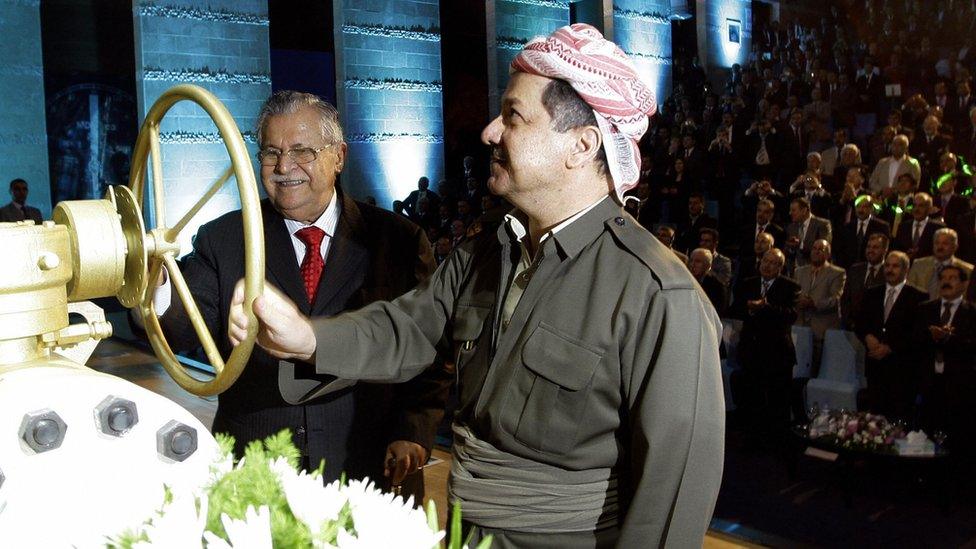
Iraqi President Jalal Talabani (L) and Kurdish regional president Barzani ceremonially start oil exports from Kurdistan
2009 June - The Kurdish government begins crude oil exports to foreign markets. Contractors are to pump 90,000-100,000 barrels a day from two northern oilfields to Turkey. The central government is allowing its pipeline to be used in return for a share of revenues.
2009 July - Massoud Barzani is re-elected as president of Kurdish autonomous region.
Ruling two-party coalition wins parliamentary election, but with reduced majority. Recently-formed group Change Movement (Gorran) wins 25 seats in 111-seat regional parliament.
2011 February - Public protests against corruption and power held by KDP and PUK start in Sulaymaniyah city, heartland of opposition Change Movement; at least two protestors killed.
2011 August and October - Turkey launches air and ground assaults on PKK militants in Iraqi Kurdistan.
Oil row
2012 April/May - Oil exports from Iraqi Kurdistan are halted amid a row with central government over contracts with foreign firms. The region says it expects to start exporting oil via a new pipeline to the Turkish border in 2013.
2012 June - Turkish air force strikes at Kurdistan Workers' Party (PKK) rebel bases in northern Iraq days after eight Turkish soldiers are killed in a PKK attack in southern Turkey.
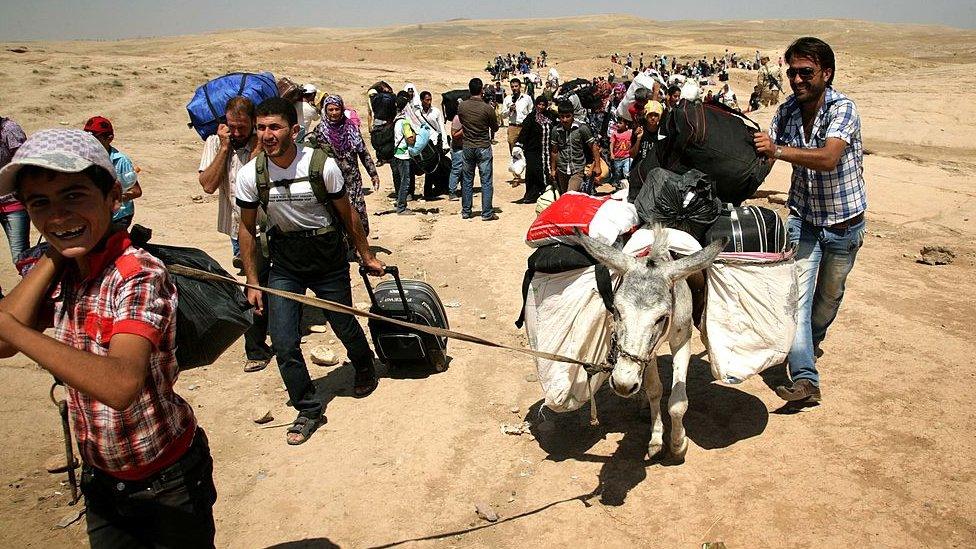
Thousands of Syrians streamed into Iraqi Kurdistan to escape the civil war at home
2012 September - Turkish air force says it kills 25 PKK rebels in further strikes on bases in northern Iraq.
2012 December - Jalal Talabani, Iraq's Kurdish president, suffers a stroke. He undergoes treatment in Germany and makes progress.
2013 April - At least 31 people are killed and more than 200 others wounded in explosions in cities across the country, including Kurdistan.
2013 June - Iraqi cabinet holds a meeting in Iraqi Kurdistan in a symbolic effort to reduce tensions over a range of political and economic disputes.
Refugee flood
2013 May - Flood of refugees from Syria prompts authorities to shut the border temporarily.
2013 August - President Barzani secures a two-year extension to his second term of office.
2013 September - Regional parliamentary elections provide an upset to the government, as the opposition Change Movement wins 24 seats, pushing Iraqi President Jalal Talabani's Patriotic Union of Kurdistan (PUK) into third place. The Kurdistan Democratic Party (KDP) of regional President Massoud Barzani remains the largest bloc with 38 seats.
2014 March - The Iraqi government under Prime Minister Nuri al-Maliki blocks the transfer of revenues to the Kurdish authorities, leaving regional leaders unable to pay the salaries of officials.
2014 May - Kurdistan officially markets its first pipeline oil, despite opposition from the government in Baghdad.
2014 June - As the Sunni coalition led by the hardline Islamists of ISIS (The Islamic State in Iraq and the Levant) seizes control of much of Anbar Province and the approaches to Baghdad, Kurdish Peshmerga forces capture Kirkuk - the oil-rich city outside the borders of Iraqi Kurdistan that Iraqi Kurds have long regarded as their capital.
Independence plans
2014 July - President Barzani announces plans for an independence referendum later in the year, saying that independence is a "natural right".
2014 August - Islamic State conquers several Kurdish-held towns.
US jets support Kurdish Peshmerga forces by striking jihadist positions.
Islamic State defeat Peshmerga forces defending town of Sinjar, prompting an exodus by people of the Yazidi religious sect.
US, Iraqi government supply Peshmerga fighters with weapons to help them battle Islamists.
Iraqi Prime Minister Nuri al-Maliki - who had come to be seen as an increasingly divisive figure who alienated the Kurds - is replaced by Haider al-Abadi.
2014 September - Kurdish leaders agree to put independence referendum on hold, on the grounds that fighting Islamic State is currently the top priority.
2014 October - The Iraqi Kurdistan government sends Peshmerga forces to the northern Syrian city of Kobane - via Turkey - to back fellow Kurdish fighters attempting to defend the city from attack by Islamic State militants.
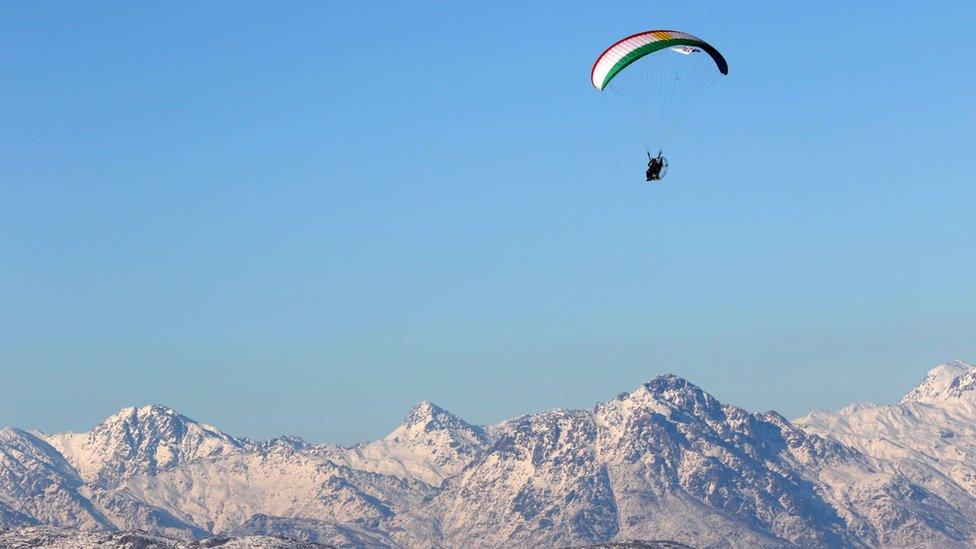
The Korek Mountain resort is the flagship project of Iraqi Kurdistan's tourism industry, which in 2014 suffered the impact of the offensive by the Islamic State group
2014 December - The Iraqi government and the Kurdish leadership sign a deal on sharing Iraq's oil wealth and military resources, amid hopes that the agreement will help to reunite the country in the face of the common threat represented by Islamic State.
Peshmerga and Syrian Kurdish fighters retake Mount Sinjar from Islamic State forces.
Constitutional reform
2015 May - Iraqi Kurdistan parliament appoints committee to oversee revision of constitution. One of the issues under review is the number of terms the president should be allowed to serve.
2015 June - President Barzani's chief of staff announces that a presidential election will be held on 20 August, a day after Mr Barzani's current term of office expires. The president's critics accuse him of seeking to pre-empt any revision to the constitution that would prevent him from serving a further term.
2015 July - Turkey joins the US-led military alliance against Islamic State but insists that air-strikes against IS should go hand-in-hand with operations against Kurdish PKK militants in northern Iraq. Ankara launches a bombing campaign against the PKK in northern Iraq - the first time that it has attacked the Kurds since reaching a ceasefire with them in 2013.
2015 August - Barzani's extended term in office ends. He is given another two years in a move described by the opposition as illegal.
2015 September - A US court rules in favour of an Iraqi government bid to block Kurdish oil sales to a US buyer.
2015 October - Gorran (Change Movement) expelled from coalition government following days of violent street protests against Barzani.
Parliament is suspended.
2015 November - Iraqi Kurdish Peshmerga forces and Turkish-Kurdish PKK guerrilla fighters, backed by US-led coalition forces, recapture Sinjar town from IS.
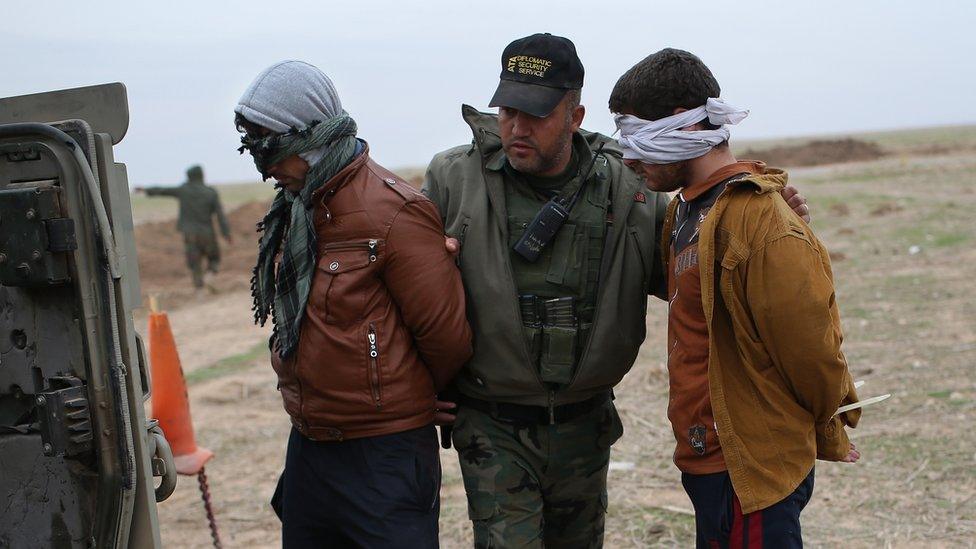
A Kurdish Peshmerga fighter detains suspected Islamic State militants following the capture of the town of Sinjar
2015 December - Iraqi parliament approves allocation of Kurdistan Region's 17 per cent share of the national budget despite opposition from the Dawa Party of former Prime Minister Nuri al-Maliki.
2016 January - Barzani says era of Sykes-Picot agreement and the Treaty of Lusanne that divided the Middle East has ended and the international community needs to redraw borders to include a Kurdish state.
Financial crisis
2016 February - Regional government decides to cut the pay of public service employees to tackle a deepening financial crisis.
2016 April - US begins paying salaries of the Kurdish Peshmerga fighters taking part in the anti-IS battles.
2016 June - Regional government threatens to cut water supplies from the Tigris River to the rest of Iraq after Baghdad buys smaller than expected quantities of wheat products from Kurdistan.
2016 June - Peshmerga forces report increasing use of "chemical weapons" by IS and plead for more weapons for fight the militants.
2016 July - US and regional government sign a memo of understanding for Washington to provide more military aid to Peshmerga forces, a move which angers Baghdad.
2016 August - Germany resumes direct shipment of weapons to Iraqi Kurdistan after regional government pledges to prevent the weapons from ending up on the black market.
2016 August - Abduction and killing of Iraqi Kurdish journalist Wedat Hussein Ali in the KDP stronghold of Duhok Province draws widespread condemnation.
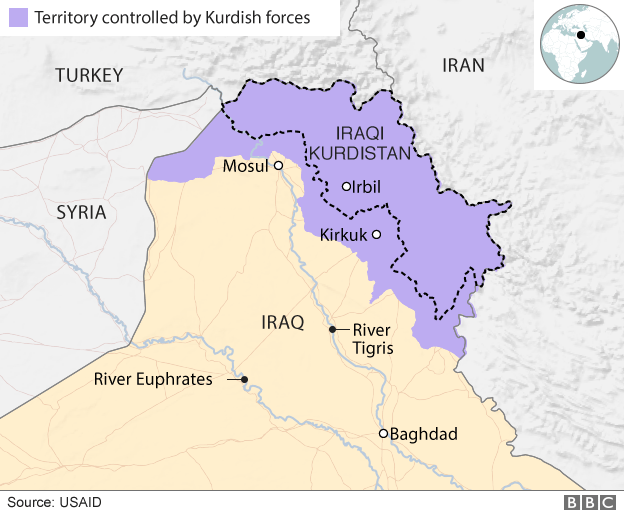
2016 September - Civil servants announce indefinite strike mainly in Sulaymaniyah Province over pay cuts and delays in salary payments.
2016 October - IS carries out a commando attack in Kirkuk's inner districts. Peshmerga and volunteers reclaim full control of the city after several days of street-to-street fighting.
2016 November - Peshmerga capture the mainly Christian town of Baashiqa from IS as part of operations to recapture Mosul. Peshmerga officials say they will not advance beyond the town.
2016 November - Human Rights Watch (HRW) accuses Peshmerga forces of systematically destroying Arab homes and villages in areas retaken from IS.
2016 December - The Kurdistan region says it will not abide by an OPEC agreement to reduce oil production to help cut Iraq's overall oil output.
American oil giant Exxon Mobil pulls out of half of the six exploration blocks it operated across Iraqi Kurdistan.
Increased oil activity
2017 January - Russian Gazprom Neft plans to increase oil extraction in Iraqi Kurdistan despite the security threat posed by IS.
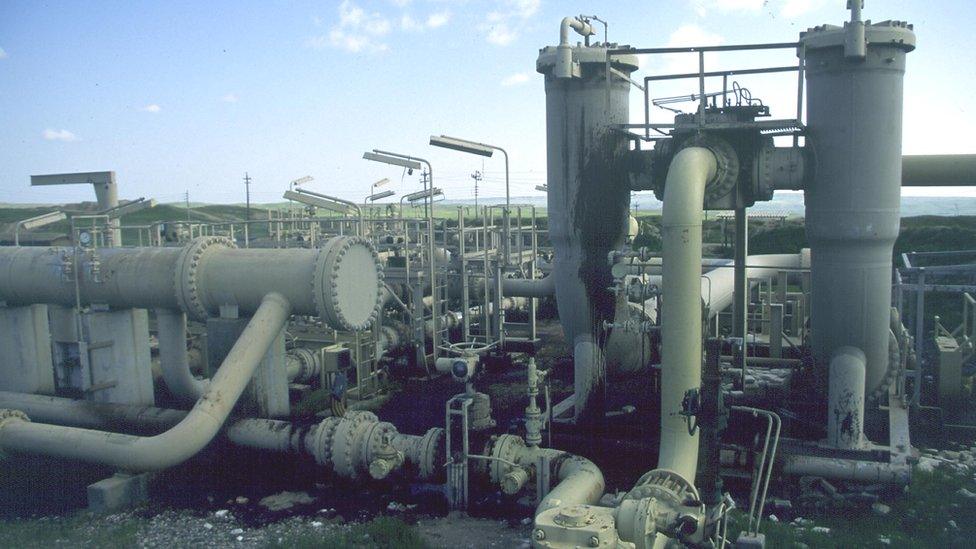
Kurdistan has been exporting oil independently from the central government in Baghdad since 2014
2017 February - Turkey raises the Kurdistan region flag during a visit by Barzani.
2017 March - The governor of disputed city of Kirkuk orders the Kurdistan regional flag to be flown over all government buildings, drawing condemnation from Baghdad as well as Iran and Turkey.
2017 April - Turkish jets carry out deadly air strikes on Peshmerga positions near Sinjar in Iraq and Syrian Kurdish fighters across the border in Syria.
Russia's Rosneft reportedly pays 1 bn US dollars in advance for Iraqi Kurdistan's crude oil, signalling growing Russian interest in the region's natural resources.
Date set for referendum
2017 June - A cross-party meeting led by President Barzani agrees to hold an independence referendum on 25 September.
2017 August - Prominent Kurds establish the "No for now" movement, saying it would be wrong to hold a referendum under current security and economic conditions.
The provincial council of disputed Kirkuk votes to take part in the referendum.
2017 September - Independence referendum goes ahead in the face of international opposition. Baghdad moves to assert its authority and imposes punitive measures.
2017 October - President Barzani resigns.